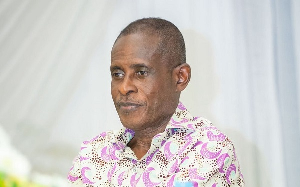Social Print Industry Printers appeal to government for fair Quotas
Accra, March 6, GNA - Executive Members of the Ghana Printers and Pa= per Converters Association (GPPCA) on
Wednesday appealed to government to ensure that 60 per cent quota of government textbooks were produced locally. The Association is also calling for a level playing field between imported foreign printed books and the locally
produced ones in the area of tariffs. Mr J. Appiah Berko, President of GPPCA, made the appeal to Mr Mahama=
Ayariga, Deputy Minister of Trade and
Industry, in Accra when the executive members of the Association joined t= he minister to pay a working visit to selected
publishing houses to ascertain the challenges facing the industry and to see how these could be addressed. The publishing houses included Graphic Packaging (a subsidiary of the=
Graphic Communications Group Limited),
Safeway Printing Work Limited, Buck Press, TYPE Company Limited, Sakoa Pr= ess and Yasarko. "The Ministry of Education has displayed open reluctance to follow t= he government policy to procure the 60 per cent
of these textbooks locally citing unconvincing excuses," Mr Berko said. He expressed dismay that foreign-produced books did not attract dutie= s and taxes, adding that foreign governments
granted export subsidy and other incentives on their export prices that g= ave them price advantage. Mr Berko said the more than 32.5 per cent pre-production tax that lo= cal printers had to pay on their books, together
with the more than 25 per cent interest they had to borrow from the banks= to pay for the taxes upfront and other
production costs, made the prices of locally produced books higher than foreign printed ones. He gave the suggestion that either local printers were made to enjoy=
all the tax concessions currently applicable to
the foreign printers "or government should tax foreign printed books the same rates applicable to locally-produced
books in line with the foreign agreement which the government relied upon= to grant the tax exemption to the foreign
produced books." Mr Berko said, "Government should, by a legislation, reserve a minim= um of 50 per cent production of packaging
materials, phone recharge cards and all printed materials for the local printing industry in order to generate the needed
employment for the unemployed youth and wealth for the nation." Mr Ayariga on his part expressed surprise that most of government textbooks were produced outside the country
even though capacity for printing existed locally. He gave the assurance that the Ministry of Trade and Industry would investigate the matter further and would
ensure that government's policy of 60 per cent of the textbooks produced locally was implemented. Mr Ayariga called for proper monitoring measures to ensure that thos= e who sourced contracts to produce
government textbooks did so locally. At separate meetings, managements of the companies visited told Mr Ayariga that the printing industry was facing
challenges, including erratic electricity supply, high cost of raw materials, and high interest rates that threatened the
survival of the industry. The situation at the Safeway Printing Work Limited was not encouragi= ng as the privately owned printing house, with
many modern printing machines, was producing below capacity even though i= t was incorporated 15 years ago. Madam Christie Darko Amo, Administrative Manager of the Company, appealed to the Minister to give the company
the opportunity to source government contracts so that Management could provide employment opportunities to many
of the workers who had been laid off due to financial constraints.
Regional News of Thursday, 6 May 2010
Source: GNA
NSOC 027
Opinions











